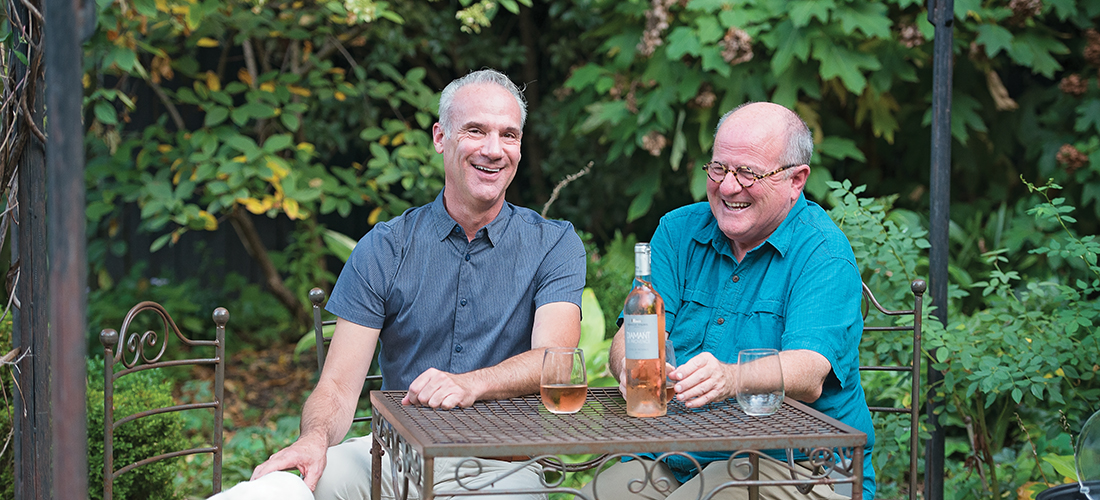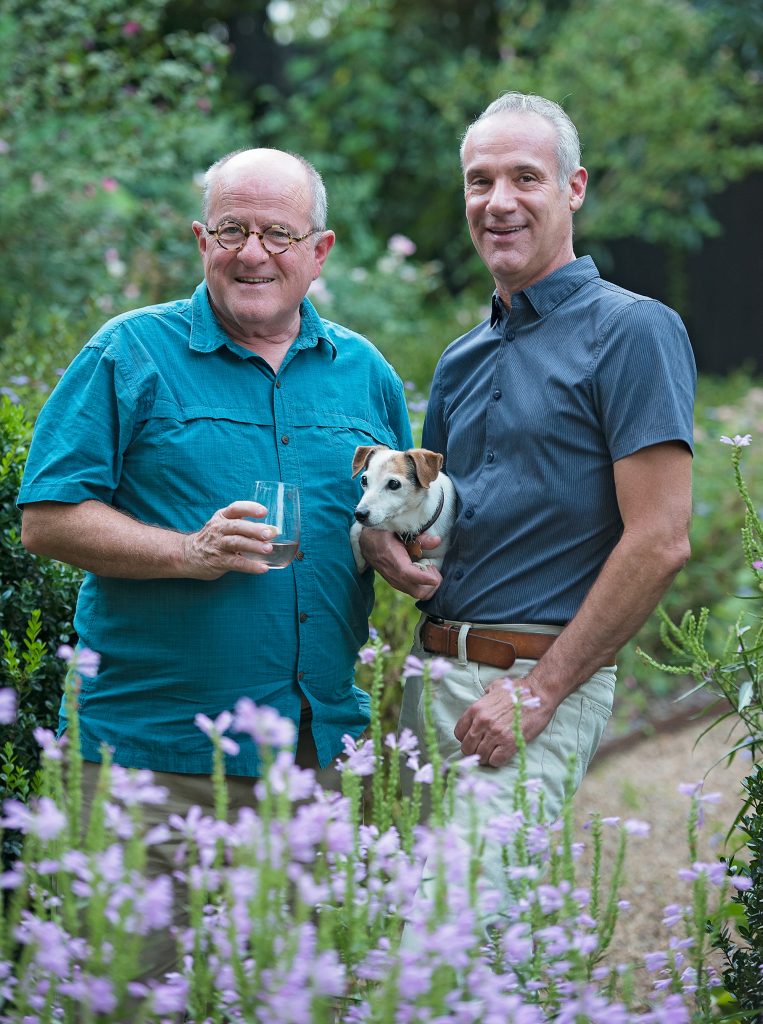
A few revealing — and hilarious — moments with
the South’s most beloved garden designers
By Jim Dodson • Photograph by Amy Freeman
Greensboro residents Chip Callaway and Randy McManus aren’t just two of America’s most beloved garden designers but close friends for more than two decades, not to mention pals of O.Henry magazine.
Having designed more than 1,000 gardens ranging from classical estates to backyard patios, landscape architect Chip Callaway — based in a pair of Fisher Park, Mission Style bungalows — has been called “The Garden Artist” by Garden & Gun Magazine.
Greensboro native Randy McManus’ innovative floral designs have made him one of the South’s leading special event designers with encomiums from the likes of Southern Accents, This Old House and many other leading home and garden publications.
On a recent balmy Indian summer evening, we invited Greensboro’s Garden Guys for a little wine and garden talk in Chip’s garden. A lot of laughter ensued — and no small amount of green wisdom was shared.
•
OH: So, how exctly did you guys meet?
CC: How else? In somebody’s garden. Mary Hart Orr had a fantastic garden here in town, and I was helping her with some of my ideas. Randy showed up with some flower arrangements for a party she was giving and we just hit it off, a great friendship right off the bat. Not long afterwards I invited him up to my house in the mountains, and soon he had to have his own mountain house — with a sodded roof, no less, absolutely amazing. We’ve been good friends ever since.
•
OH: Speaking of mountain houses, Randy, how is your amazing house [near Floyd, Virginia] with its gorgeous roof garden?
RM: As a matter of fact, I sold it to another friend not long ago. I found that when I was up there I was always working on the gardens and playing maintenance-man, never quite relaxing. When Chip was there, on the other hand, he was always relaxing.
CC: Now he comes to my house. Randy’s the best houseguest you could ever have. He’ll come to visit and wind up working on your yard for free.
RM: Actually, Chip hates to invite me over to his house, because he says I drink up all his mixers.
CC: It’s true. He does. I have all the liquor you can imagine, but when Randy leaves, there’s not a lick of club soda or mixers in the house.
RM: Plain tap water isn’t good enough for Chip. He says fish do a lot of things in water you just don’t want to know about.
CC: Oh, indeed they do. It’s horrible. I strictly advise using tap water only on your garden.
•
OH: They say you never forget your first love. What about first gardens?
CC: I sure remember mine. I was 8 years old and ordered a dozen roses for a dollar from the Sunday rotogravure magazine. This was up in Mount Airy.
My daddy had hunting dogs in a run that was full of waste. I planted those roses in that area and you can’t believe how they grew. I sold the blooms for a nickel apiece to my mama’s friends and got amazingly rich. One day I came home to find that some lunatic had cut them all down for a wedding party and I nearly had a breakdown and had to be carried off. There went my Popsicle money!
RM: My story’s not quite as dramatic. I made a little area at the back of my family’s farm south of Greensboro. I relocated some maples and cedars, and mowed the grass, creating a little park. I was about 9. Mowing grass was how I started my business by the 12th grade. Both sets of my grandparents were people who grew their own food, very self-sustained. They put up vegetables for the winter. I always liked that. I started rooting everything in sight and built my own green houses and started selling plants to people. That’s how I got started.
CC: [Laughing] On the contrary, your story is so totally inspiring. Sex and the single plant!
•
OH: So what is it about gardening that grabs us so deeply — whether young or old?
RM: Gardening is great therapy — whether you’re making a garden or just enjoying one someone else built. [Gardens] take you somewhere calmer and settle the mind. If working with plants pleases you, you’re probably a gardener.
CC: Randy’s right. Most of my clients are high-energy folks with demanding jobs who, when they get home in the evening, just want to chill in the garden, like disappearing into Eden, away from their working lives. That’s an ancient instinct in everyone. A garden brings it alive.
•
OH: I read somewhere that all gardeners are show-offs at heart — and very generous. True?
CC: Absolutely true. Gardeners are some of the most generous people on Earth. They love sharing their knowledge and plants. I think it’s a genetic thing, something in our DNA. We hail from an earlier time when we had to share wisdom about growing plants and food or else the tribe would fail.
RM: If you grow it and give it away, it’s almost like knitting someone a sweater, an act of simple kindness. Kindness and humor are strong personal traits of gardeners. For a lot of us, gathering and sharing seeds from our plants is even more fun. Gardeners love to share their favorite plants with you.
CC: Especially if they’re invasive!
RM: I love invasive plants. You can always contain an invasive plant. I can’t stand plants you have to pray over — like roses of any kind.
CC: Amen! I told a client who asked me what she should do with all her roses, as I was finishing up her garden: Dig them up and put them on the curb for the trash man on Thursday. Wouldn’t you know, I drove by her house the next week, and she had this man digging up those sorry tea roses and planting them along the border of her driveway. Some people just don’t listen.
RM: The clay and humidity here make roses such a challenge. All the spraying, mold, bugs. We shouldn’t even grow roses in North Carolina. So much work for so little reward.
OH: Wow. So you guys don’t like roses, eh? Where should one grow them?
CC: In someone else’s garden! Preferably in a galaxy far, far away or at least some place where there are sandy soils and not so much heat and humidity. Maine? Michigan? England? Take your pick.
•
OH: So what garden plants in the Piedmont are you keen on? What’s hot for late summer or even early fall?
CC: I don’t really like clematis that much but I have a hardy clematis called Starlight that I just let go around Fourth of July and it goes wild with gorgeous blooms. I’m also keen on Confederate Jasmine, which people now politely call Madison Jasmine. Incredible smell and beautiful green foliage. I’m also a believer in using companion vines like moon vine and morning glories, too.
RM: I love moon vine. When I was restoring the Ayers estate in Sedgefield [the project that launched Randy’s career] I needed something to cover up a chain link fence around a swimming pool. I soaked the seed of moon vines and planted a seed every foot. In almost no time, those vines completely covered that fence, putting out a wall of green and putting out the loveliest perfume when they opened at dusk. They had a wedding there in the fall that year. People loved it.
CC: Moon vines attract an amazing moth too — these huge, gorgeous hummingbird moths that look like Walt Disney created them. They put on a show.
•
OH: How about favorite trees for this area? Fall being a great time to real plant them . . .
RM: Magnolias. I know some people realy despise them. But I love magnolias. Their waxy green leaves and creamy blooms make such a beautiful background to a garden. Also, they stay green through winter which gives you color in a garden through the year.
CC: I like magnolias, too — as long as they’re in my neighbor’s yard. I’m terribly high on Autumnalis cherries. They bloom twice a year — spring and sometimes into mild winter in these parts — and are more heat-tolerant and hardy and long-lived than other varieties of cherry trees. Wonderful trees.
OH: What about bluebells? I have a friend in Fisher Prk who gave me a bunch of English bluebells. Where should I plant them?
RM: They like to have damp feet and some sun and shade. Like a union worker, you have to give ‘em a break in the middle of the day.
•
OH: Speaking of trees, Randy, how are your banana trees doing?
RM: [Laughing] Just great. I love my banana trees. I once took a chain saw and cut them off and they came back bigger and better than ever the next summer. I even stopped mulching them. They’re so excotic and growing in popularity around here. They make my house [a restored Mid-Century bungalow in Browntown] look like the home of an elderly Miami Jewish lady.
CC: I dislike their big leaves. They hide the entire garden. Besides, I’m a great believer in growing what is natural to your zone. I’m big into historic garden plants, too.
RM: That’s what I like about banana trees. Mine give me great privacy.
CC: Maybe you just need to have great privacy. Banana trees wouldn’t work in my home garden because I change things constantly. I had some elephant ears that were very pretty this year, but they won’t be back next summer. On the other hand, some things just get better with time I love summer phlox. They’re beautiful and smell delightful. Also, obedient plant, which is really not obedient at all and will run like crazy everywhere if you don’t keep an eye on it like an unruly child.
RM: You have great moss in your garden, too. My garden went from being a sun garden with grass to a shade garden with moss. If you keep the leaves off it and slightly watered, moss will do beautifully over the winter and come back like crazy when the winter sun hits it.
•
OH: So how about some basic tips for local gardeners as we transition from fall into winter?
RM: To be a gardener you really have to be prepared for change. A garden doesn’t stand still. It grows and changes with time. Planning ahead for a garden that will change, for instance, from sun to shade is very important. So is irrigation. Knowing when and how to water is something even many experienced gardeners fail to understand. Some automatic sprinkling systems just waste water and never do the job properly. Everyone should read their irrigation manual and watch how it waters their gardens.
CC: I totally agree. That brings us back where we started — talking about water. If you water your plants long and deep at least once a week, especially as autumn shifts to winter, they will put down deeper, better roots. That results in much healthier plants.
•
OH: So what do you guys do over winter?
CC: Besides going some place insanely warm and sunny?
RM: I love gathering seeds from my plants. That’s going on now. I’ll gather seeds all fall and winter. I’d rather have seeds from a seed swap than from a catalogue, because you know exactly where they came from and can talk to the people who grew the parent plants. I just wish there were more seed swaps like there used to be.
CC: Randy is brilliant at gathering and rooting seeds. My seeds tend to come up in the parking lot of my business, unfortunately. But this is the time to divide and conquer your perennials and mulch your garden and start thinking about what you want to do next year. I’m already doing that for my customers now.
OH: So 2017 will be the year of moss yards and banna trees?
RM: Moss is very primal. And you don’t have to mow it!
•
OH: Is it true you can you can make moss by blending pieces of it with buttermilk in a blender and spreading it on a surface.
CC: Yes you can. But you have to throw away the blender. There are better uses for a good blender, I must say.
•
OH: Have you guys ever thought of doing your own radio call-in show? You could be the plant world’s answer to Click and Clack.
RM: [With a coy smile] What a frightening thought.
CC: Don’t kid yourself. He’d love it. OH






